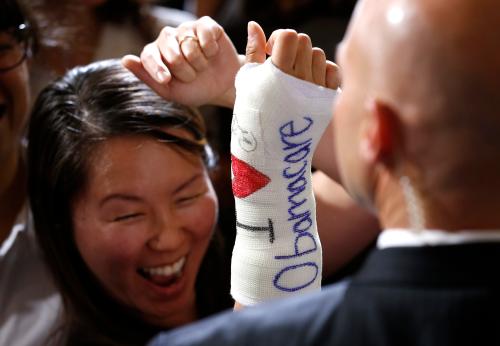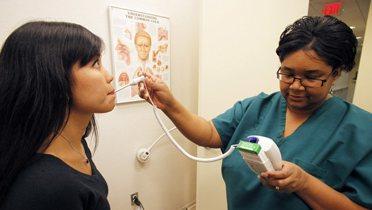The Small-business Health Options Program, the so-called SHOP exchanges, has become the wallflower at the Obamacare party. SHOP was meant to be a one-stop health-insurance marketplace for businesses with up to 50 employees that would expand choice for employers and employees alike, provide information, and promote competition.
Whatever you may think about the health exchanges for individuals or the Medicaid expansions, they have unquestionably expanded coverage. More than 10 million individuals buy coverage through state and federal health exchanges. More than 7 million more have coverage because of the expansion in Medicaid. The Medicaid numbers would be far higher had not 19 states, including such biggies as Texas and Florida, refused to expand coverage for their poorest state residents, even though the cost to each state of doing so would be negligible.
In the case of coverage for small businesses, the ACA’s SHOP exchanges have fizzled. To be more precise, fewer than 1/3 of 1 percent of employees in businesses with 50 of fewer employees are insured through SHOP exchanges. And that is a pity, because the ACA SHOP eases the purchase of insurance for employers and broadens choice for their employees.
Small businesses are staying away from SHOP exchanges in droves for several reasons. Among businesses employing 50 or fewer workers, only about one-third offer health insurance, and the ACA does not require them to do so. In addition, many small businesses have remained unaware that SHOP exchanges even exist. The various SHOP exchanges have experienced some technical problems similar to the much-publicized difficulties at the launch of of the individual exchanges.
The ACA offers small financial incentives to only a tiny fraction of low-wage small businesses to offer insurance to their workers and nothing extra if they buy it through SHOP exchanges. In contrast, individuals with low or moderate incomes can qualify for sizeable financial incentives-tax credits and cost sharing subsidies-but only if they buy coverage through the individual exchanges. As a result, roughly 85 percent of the customers of the ACA’s individual exchanges receive such subsidies.
Political resistance to the ACA among small businesses and the organizations that represent them has long been fierce. The National Federation of Independent Businesses has long and strongly fought any mandate that their members offer health insurance to their employees. They first vigorously and successfully opposed health reform under President Clinton. With slightly less vigor but no success at all, they fought Obamacare in Congress. After Obamacare became law, they continued to fight it in the courts, alleging unsuccessfully that Obamacare tax credits are unconstitutional. For some small businesses, the SHOP exchanges are tainted by association.
Yet another reason why so few enterprises have patronized SHOP exchange is simple inertia, the general hesitance to change arrangements by even those small businesses that offer coverage to their workers. One acquaintance put the point better than I can. He is a strong ACA supporter who runs a small business in the District of Columbia health exchange authority which requires small businesses who offer insurance to buy it through the DC SHOP exchange. He wrote to me:
“People really don’t like to screw around with their insurance. If they are happy with the insurance they have, they don’t want to play games with the exchange. As a small DC employer, we are now being forced onto the exchange here. It looks like we will be able to get a very similar plan to the one that we had before, but it is causing a lot of anxiety. My staff really did not want to change policies. And there are things I would rather do than fight with my staff over health insurance.”
The fact is that he and other small business owners and their employees will enjoy tangible gains from going through the SHOP. They can use DC HealthLink, a relatively simple online portal that enables easy comparison among scores of available plans. Insurers must compete openly for his business, a process that will help hold down premiums. His employees would have more choice among a menu of competing plans that they have ever had before. Small-business owners who offer health insurance now usually retain the services of a broker or agent to help them negotiate the technicalities of health insurance. Many brokers are reported to bad-mouth the SHOP out of a fear that the exchanges will make their services obsolete, much as the internet has largely replaced travel agents. Though real, these fears are largely misplaced because the brokers provide a host of services useful to small businesses.
The requirement that small businesses who choose to offer insurance buy it through the SHOP exchanges can be a win/win for employers and their workers—lower premiums and more choice. Other states should look at the record in the District of Columbia. They should consider making small businesses an offer they can’t, and shouldn’t want to, refuse.







Commentary
Op-edThe wallflower at the Obamacare party
August 12, 2016